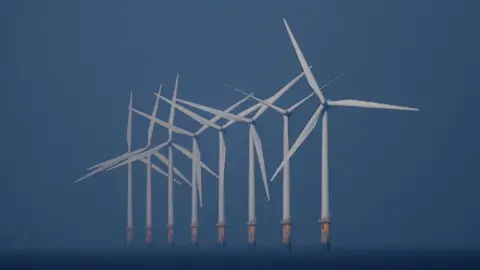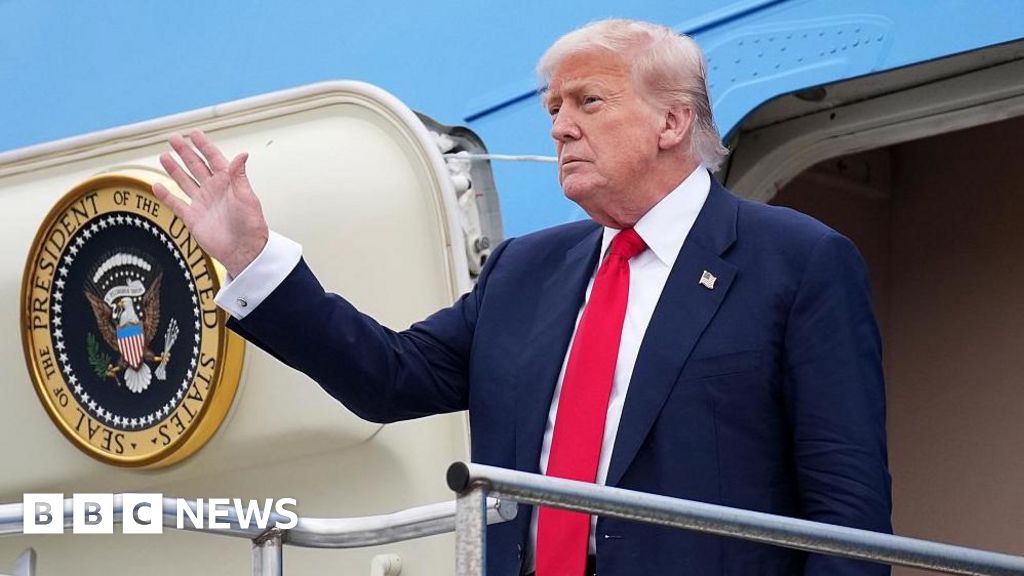Helen Catt
Political correspondent

 Reuters
Reuters
The government has increased the maximum price it will pay to companies for the electricity generated by new wind farms.
It comes as ministers are trying to meet challenging pledges to bring down household bills and create an electricity grid that it is almost entirely free of fossil fuels by 2030.
The Department for Energy Security and Net Zero published the details ahead of the latest auction for government-backed contracts.
The auction opens in August and will be one of the last which can deliver projects in time to meet the government's target of Clean Power by 2030.
The Conservatives have described the new prices for offshore wind as "eye-watering".
The government said the prices would not be what is eventually paid, as companies will put in lower bids to win contracts.
A spokesperson for Energy Secretary Ed Miliband said "the auction will reveal the true price, just like it did last year, where the auction cleared at prices significantly lower".
Each year, companies who want to build renewable energy projects bid for government-backed contracts.
The government agrees to pay them a fixed price for the electricity they produce for a set period, now up to 20 years, and up to a maximum price known as the Administrative Strike Price, or ASP.
Firms put in bids below the ASP to win project contracts and then the government sets a new guaranteed price, known as the clearing price, based on those.
This year, the maximum guaranteed price for offshore wind will be £113 per megawatt-hour, up from £102 in 2024.
Floating offshore wind, which is a newer technology, is more expensive at £271/MWh, up from £245.
Onshore wind has seen a smaller rise from £89/MWh to £92 while the price for solar energy has come down to £75/MWh from £85/MWh.
Conservative Shadow Energy Secretary Claire Coutinho said: "These are eye-watering prices - the highest in a decade and way above the average cost of electricity last year. And this is before the hidden costs of grid, storage and wasted wind which all end up on our energy bills"
She claimed Ed Miliband was putting "Net zero zealotry above the economy or the cost of living".
The government argues that switching to renewables will protect consumers from volatile gas prices and bring bills down "for good."
Johnny Gowdy, from not-for-profit group Regen, which advises on transitioning to net zero, said the ASP was about "setting the starting point for the auction; with competitive bids we would expect the actual auction strike price to be much lower"
"There is also a trade-off between volume and price. If the bid prices are high then the government will procure less capacity. If the price is low then the government will be able to buy more capacity."
He says that the cost of producing offshore wind "probably has risen over the past couple of years" but he adds "we will have to wait and see the auction outcome" to find out how much.
Previous auctions have resulted in a clearing price that was lower than the maximum offered.
There is a risk to setting the maximum price too low.
In 2023, under the Conservatives, no offshore wind developers bid for any projects as they said they weren't viable at the price offered.
The government has made changes to the system in the hope of attracting more bids to create competition.
For the first time this year, offshore wind projects which don't have yet have full planning permission will be able to apply for a contract.
The contract lengths have also been extended for wind and solar projects from 15 years to 20 and the Energy Secretary will be able to see developer's bids before he sets the final overall budget.
A spokesperson for DESNZ said its reforms to the system would "enable a competitive auction that secures the best possible price for consumers while securing the clean energy we need to get us off the fossil fuel rollercoaster."

 1 day ago
1
1 day ago
1










 English (US)
English (US)